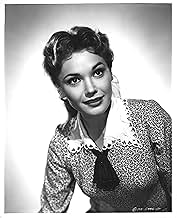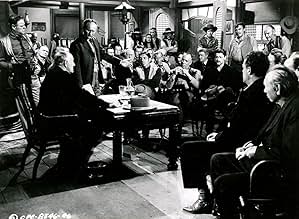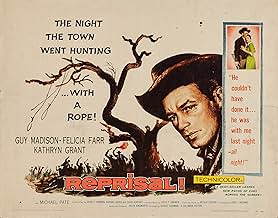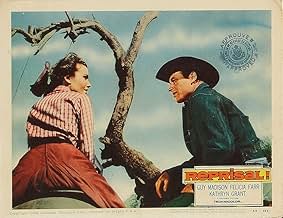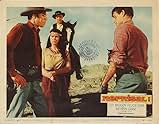Half-breed Frank Madden claims he's White, in order to own land, but violent racial clashes in town force him to abandon his neutrality and chose a side.Half-breed Frank Madden claims he's White, in order to own land, but violent racial clashes in town force him to abandon his neutrality and chose a side.Half-breed Frank Madden claims he's White, in order to own land, but violent racial clashes in town force him to abandon his neutrality and chose a side.
Fred Aldrich
- Townsman
- (uncredited)
Malcolm Atterbury
- Luther Creel
- (uncredited)
Arthur Berkeley
- Townsman
- (uncredited)
Phillip Breedlove
- Takola
- (uncredited)
Patrick R. Brown
- Townsman
- (uncredited)
Bruce Cameron
- Townsman
- (uncredited)
Donald Chaffin
- Townsman
- (uncredited)
Featured reviews
A delightful surprise...this small, rich wonder of a film surely offers up Guy Madison's best performance...as the compromised cowboy....trying to deal with the racism of his villainous neighbours and their hangers-on. So refreshing to find a 1950s western which goes full-bore at the question of US xenophobia re their dealings with their first nations people. Not a political diatribe.....good simple narrative with well-played, not overplayed, characters, good dramatic ducking and diving.
It was interesting to learn that the origin of the film Reprisal! was a novel set in the post World War II south and it had to do with racial prejudice against black people. One can easily see why Columbia Pictures did not want to do an adaption in that vein. That southern market even in the beginning of the civil rights era was still a potent force. Ergo the setting was changed to the old west and the object of prejudice were Indians.
Saying that Reprisal! is still a very powerful film and one hopes that in theaters in the south some people did get a more subtle message from the film. In a role similar to the one that Robert Taylor played in Devil's Doorway, Guy Madison plays a mixed racial individual who is passing for white because that's the only way he can own his own spread. He's bought a ranch that has been used by a trio of some loathsome brothers named Shipley played by Edward Platt, Michael Pate, and Wayne Mallory who have a bad hatred for the red man.
When Madison is accused of killing Mallory the remaining two Shipley brothers stir the town into a lynching fever. After that the truth comes out all around.
In fact Pate like many a redneck only carries his prejudice so far. He has the hots for Kathryn Grant and the future Mrs. Bing Crosby is quite the fetching woman here. I can see how this portion of the story translates into the pre-civil rights era culture in the deep south. But Grant likes Madison as does Felicia Farr daughter of the town newspaper editor Robert Burton.
Even changing the location Columbia Pictures still made a fine drama about the evils of racial prejudice. It holds up well today.
And this film review is dedicated to the people of Lancaster, New York who just changed their high school football team name from Redskins. A little viewing of this film and Devil's Doorway might give some of those who are still angry at the name change some understanding as to how offensive that name is.
Saying that Reprisal! is still a very powerful film and one hopes that in theaters in the south some people did get a more subtle message from the film. In a role similar to the one that Robert Taylor played in Devil's Doorway, Guy Madison plays a mixed racial individual who is passing for white because that's the only way he can own his own spread. He's bought a ranch that has been used by a trio of some loathsome brothers named Shipley played by Edward Platt, Michael Pate, and Wayne Mallory who have a bad hatred for the red man.
When Madison is accused of killing Mallory the remaining two Shipley brothers stir the town into a lynching fever. After that the truth comes out all around.
In fact Pate like many a redneck only carries his prejudice so far. He has the hots for Kathryn Grant and the future Mrs. Bing Crosby is quite the fetching woman here. I can see how this portion of the story translates into the pre-civil rights era culture in the deep south. But Grant likes Madison as does Felicia Farr daughter of the town newspaper editor Robert Burton.
Even changing the location Columbia Pictures still made a fine drama about the evils of racial prejudice. It holds up well today.
And this film review is dedicated to the people of Lancaster, New York who just changed their high school football team name from Redskins. A little viewing of this film and Devil's Doorway might give some of those who are still angry at the name change some understanding as to how offensive that name is.
I watched this film by accident, really, but it was actually very entertaining. The actor who played Guy Madison's grandfather was particularly good. I especially liked how the Native Americans were portrayed as human beings and not ruthless killers. This film was released in 1956, which shows a great effort for the producers to make such a film. The message is about unity and the human spirit. For that time period, I found the movie unique. It kept me watching. Plus, Madison has an interesting appeal as an actor because he never really made it big here in the United States. We know not all actors are great actors, and Madison wasn't phenomenal. However, he wasn't bad, either. So why wasn't he more of a major star? And even though I don't watch too many Westerns, I'd rather watch Madison than most of the other Western stars of that time. Like I said, interesting...
Pretty good western if you can get past Guy Madison as part Indian. Hiding his Indian blood so he can own land, Frank Madden (Madison) gets in trouble when one of the vicious Shipley brothers is killed for which he's blamed, and a lynch mob forms.
Actually, there's more plot here than the 70-minute run time can accommodate. Add the two leading lady sub-plots to the Indian sub-plot to the Shipley brothers main plot, and you've got a lot of story complications. The screenplay does a fair job of integrating them, but there's still an overflow.
The real oddity is Michael Pate playing a white guy (Bert Shipley) instead of an Indian in a western where Indians are featured. In fact, he darn near made a career out of playing Native Americans, so I'm wondering if a cast member dropped out at the last minute such that he had to switch roles. Anyway, he nearly steals the film with a lively, colorful performance.
Also, veteran director Sherman manages to inject genuine energy into the several crowd scenes, especially the lynch mob march down the street that had me really worried for the hapless Madden. Then too, the Arizona locations add a scenic touch to a B-western that could have easily cut corners and stayed in LA. All in all, it's a decent, if crowded, little western with some interesting features.
Actually, there's more plot here than the 70-minute run time can accommodate. Add the two leading lady sub-plots to the Indian sub-plot to the Shipley brothers main plot, and you've got a lot of story complications. The screenplay does a fair job of integrating them, but there's still an overflow.
The real oddity is Michael Pate playing a white guy (Bert Shipley) instead of an Indian in a western where Indians are featured. In fact, he darn near made a career out of playing Native Americans, so I'm wondering if a cast member dropped out at the last minute such that he had to switch roles. Anyway, he nearly steals the film with a lively, colorful performance.
Also, veteran director Sherman manages to inject genuine energy into the several crowd scenes, especially the lynch mob march down the street that had me really worried for the hapless Madden. Then too, the Arizona locations add a scenic touch to a B-western that could have easily cut corners and stayed in LA. All in all, it's a decent, if crowded, little western with some interesting features.
The original novel was written by Arthur Gordon, a Southerner who was educated at Yale and Oxford. During WWII, he read about a lynching in his home state of Georgia, and was so incensed by it, he came home and wrote Reprisal. The novel is a black/white story, not Indian/white, but otherwise pretty similar. Gordon's anger was based in the fact he was in Europe fighting Facists and Nazis, and back home there were people killing citizens--just like the Nazis. Plus there were thousands of black troops fighting in Europe against the Nazis as well. The injustice was too much, and so the author fought back using his novel to illuminate the issues of race and hate.
Did you know
- TriviaThe novel on which this film is based is set in Georgia rather than Oklahoma and takes place during a later period. The lynching is that of an African-American rather than a Native American's as shown in the film.
- ConnectionsFeatured in Images of Indians: How Hollywood Stereotyped the Native American (2003)
- How long is Reprisal!?Powered by Alexa
Details
- Runtime
- 1h 14m(74 min)
- Aspect ratio
- 1.85 : 1
Contribute to this page
Suggest an edit or add missing content


